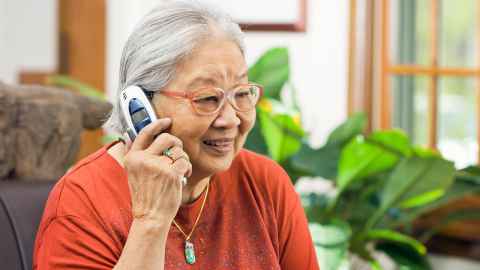Telephone or tech? Stay connected with older people
2 June 2020
New research looks at the influence of phone calls, texts, emails and video-calling has on the loneliness and isolation experienced by some older people.

Before the pandemic hit, researchers were looking at how technology helps older people stay connected. For older people lockdown has been more restrictive, making it even more important for friends and family to stay in touch. But what works best?
The large-scale investigation (CFAS Wales study), funded by the Economic and Social Research Council and published in The Gerontologist was carried out by researchers from the Universities of Auckland, Swansea and Bangor, and used data from nearly 3000 people over the age of 65 living in Wales, UK.
Taking the distance from relatives and the amount of face-to-face contact into account, the study found that telephone calls and text or emails reduced levels of isolation of older people.
It seems that the ‘oldest’ technology (telephone, text and email) are now part of routine communication practices for older people, but more recent technology used for video calls (such as Zoom, Skype and FaceTime) are used less frequently and did not influence isolation.
The study also looked at the influence of these types of communication on loneliness. Taking the distance from relatives and the amount of face-to-face contact into account, it found that only phone calls between older people 65-75 years and their relatives decreased loneliness.
The influence of telephone contact on loneliness for younger old people could suggest that they have incorporated phone calls into expectations for family relationships.
In the future communication via text, email and video-calls may also impact on loneliness if expectations for family relationships change and ‘catch up’ with the reality of a technologically connected world.
Gerontologist Professor Vanessa Burholt of the Medical School at the University of Auckland says there is an important difference between isolation and loneliness. Isolation is a lack of meaningful social contact, whereas loneliness is an emotional reaction to a mismatch between the relationships we expect and those that we have.
She says,“Everyone has their own benchmark for relationship expectations. Our interpretation of these results is that communication through technology does not match up to older people’s expectations for family relationships in later life.”
The study suggests that when families cannot meet face-to-face a phone call should be the first choice to communicate with older family members.
Media contact
Gilbert Wong, gilbert.wong@auckland.ac.nz, 021 917942